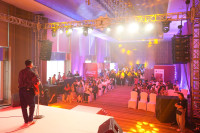Entertainment
Deconstructing and redefining success
Sumnima Setling, aka Amazumi, is one of the few Nepali female hip-hop artists who have managed to carve a niche in the country’s rap scene.
Pinki Sris Rana
In a rap scene heavily dominated by male artists, Sumnima Setling, aka Amazumi, is one of the few female rappers who has made their presence felt through music. Though not a household name yet, Setling has managed to carve a niche for herself.
Born in Hong Kong, Setling lived in Nepal for couple of years. When she was 17, she left Hong Kong for India to study TV journalism. After finishing her studies in India, Setling went to the UK to study documentary filmmaking. She now lives in Gent, Belgium.
“A recurring theme in my life is that I don’t feel like I belong anywhere. I was always a Hong Konger in Nepal and always a Nepali in Hong Kong. It was in music that I found my solace,” says Setling, who is now 35.
Setling started pursuing music full-time in 2017 after being selected in De Nieuwe Lichting, a nationwide music competition in Belgium. “I made it to the top eight, but the fact that I performed at the stage where Kendrick Lamar once performed makes it all worthwhile.”
Setling sat with the Post’s Pinki Sris Rana to talk about her musical journey, her preference for the hip-hop genre, and what it means to find her own kind of success in her thirties.
You moved around a lot growing up. How challenging was that?
It was chaotic. To have no place to belong and feel like an outsider no matter where you are is challenging to come to terms with. As an adult, I’ve made peace with that feeling, but as an adolescent, it was quite hard dealing with those feelings. But for me, music provided me solace a home could not.
What kind of music did you grow up listening to?
My first introduction to music was my father’s music collection. He had two CDs, one of Green Day and the other was Arrested Development, a hip-hop band. I think his taste for music comes from his hometown Darjeeling and mine from him. Growing up, I used to listen to a lot of hardcore rock, punk, grunge, and nu-metal. And no matter where I was, I was always a part of a band. When I was studying at Shuvatara School in Nepal, we were the school’s first girl band, and we used to perform songs on stage. The schooling, too, pushed me to want to make music.
We don’t often see Nepali artists opting for the kind of genres that you have. What made you make that artistic choice?
I grew up listening to nu-metal, which is a genre that has a lot of screaming and sort of aggression in it. But I always found that genre of music more genuine, empathetic, kind, open-minded, and hence accepting. Because I repressed my feelings as a child, I have a lot of angst still inside me, and those emotions get channelled into my songs, making them sound aggressive and rebellious.
How physically challenging is it to perform your songs in front of a live audience?
My songs definitely demand a certain level of your energy, but because I enjoy performing, I don’t take it as a challenge. Of course, I get a sore throat the day after, but I love the energy flowing in live concerts. When I am on the stage, it’s almost like I get possessed. The adrenaline rush knows no boundary when I am on stage.
What does the word Amazumi mean, and why the name?
Like music just happened to me, the name Amazumi also just happened. When brainstorming with my friend for a brand name, we tried to come up with a portmanteau word that reflected my indigenous identity and my admiration for indigenous people of Amazon forest and their struggles.
Before I adopted the name Amazumi, I sang songs as Zulu Moon, so taking bits and pieces from here and there, we ended up with the name Amazumi, and it just clicked.
Most of your songs are in English. Why is that?
I hear that a lot, but English is a language I am very comfortable with. To be able to write in any language, you must be entrenched in that language. I try to add up some Nepali and Limbu words here and there, but they have to make sense. You can’t just write for the sake of writing in the Nepali language. Eventually, I want to rap in my Limbu language.
Do you think it is harder for female rappers to get a breakthrough? What do you think about the current Nepali female rap scene?
It definitely is harder. But because it is twice as hard for women rappers to get a breakthrough, their quality of music is also better.
There are only a very few female Nepali rappers today, but the number has definitely grown over the years. We are yet to unleash our real potential, but that day isn’t very far.
Have you ever felt pressured to achieve success within a certain timeframe?
The anxiety of achieving something by the time you are this, and that does seep in from time to time. But because I went to a completely different society and started living in Gent while pursuing a career in music, it also made it easier for me to deconstruct our society’s ideology of success, and I began redefining things from my own perspective.
I was the kind of musician who was okay with my music being appreciated by other musicians. But when I came to Nepal a month earlier, the response, appreciation, and recognition I got from the people repurposed my music.




 16.16°C Kathmandu
16.16°C Kathmandu










